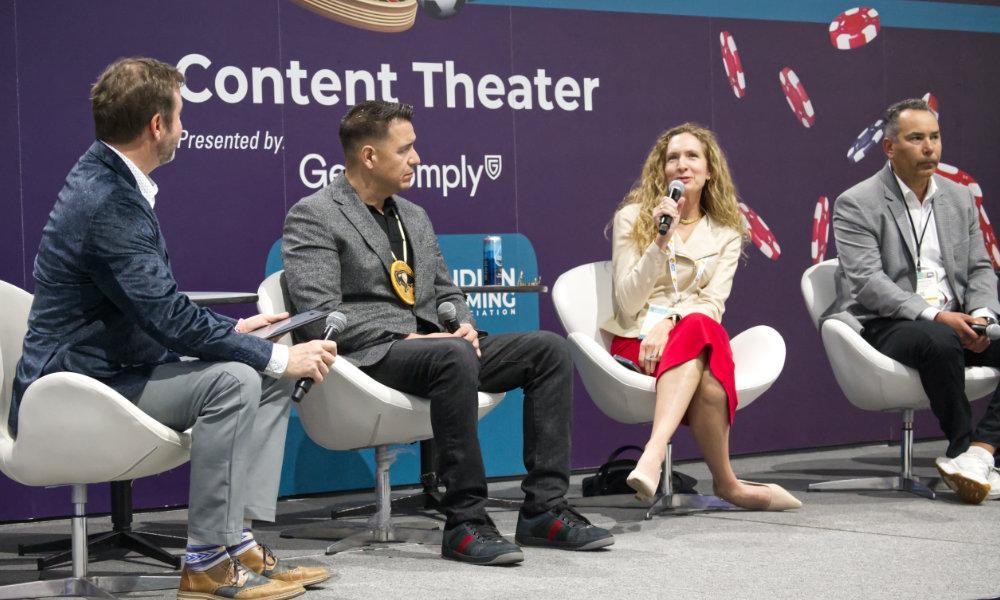In the era of the omnichannel customer, shifting behaviors are reshaping gaming. The next generation of gamblers isn’t waiting. They’ve already gone mobile.
As behaviors tend toward digital-first experiences, tribes don’t want to be left behind and must evolve, according to a panel of industry experts who spoke at the Indian Gaming Tradeshow & Convention. Casinos are dealing with the demands of mobile-savvy players and the urgency of digital innovation and tribal operators must modernize strategies to stay competitive in a rapidly evolving market.
The panel was moderated by Joe Kustelski, co-founder of Chalkline Sports, and included Bill Anderson, business development executive at SportRadar; Jai Maw, co-founder and president of Betting Hero; Dominic Ortiz, CEO of the Potawatomi Casinos & Hotels in Wisconsin; and Suzanne Leckert, co-founder of Convergence Strategy Group.
Kustelski said research at Chalkline shows that omnichannel players are six times more valuable than retail-only players.
“All the leaders in the casino business need to get in front of this and the way we had to deal with it is very exhausting,” Ortiz said. “As you look across the platform and how you build the omnichannel, we’re all land-based and have been doing it for 20 years. What’s that first step? To me, it’s going white label and social casino, what we did with our brand. We had the option to go on-premises retail sports betting with the FanDuels and DraftKings of the world, and we said we have a monopoly.
“We’re here to protect our tribal exclusivity and sovereignty,” Ortiz said. “We truly believe this should stay in the hands of the tribal nations, but we did talk to them. That’s part of the process. You have to explore all the information. That’s better than no information. We sit down to learn, talk, and grow, but we can’t be going to the market to lose $500 million. We have to get these decisions right and it’s very difficult, because the world is moving so quickly on the digital front. Land-based has a cadence. We’ve been around the IGTs and Everis and now all of a sudden, a new guy sitting across from me is seeking a 10-year contract for one of the biggest monopolies we’ve been protecting for 30 years and I don’t know him.”
Despite all of those worries, Ortiz said tribes have to go the omnichannel route.
“You gotta get out of your box and engage customers on social media,” Ortiz said. “I chose a white label for my own with the Potawatomi Sports Book and now it’s one of the top three retail sports books in the country. We continue down that path. Look to protect your brand and market and don’t give it away. If you don’t understand what’s going on, talk to your buddy, because these decisions will cost you big time down the road.”
Ortiz stressed that it’s time for tribes to work together to protect against illegal operators of sweepstakes and prediction markets. For decades, tribes have been paying gaming taxes and generating revenue and the disrupters are at their doorstep, arguing they’re federally recognized.
“They say we can come to your state and not pay any taxes and don’t need a license and take money from your customers,” Ortiz said. “We’ve got to come together on this.”
Leckert praised tribes in Connecticut for showing the rest of Indian Country the way to do an omnichannel approach. The Mohegan have a FanDuel product with sports betting and their own product as well for igaming. Everyone is also watching the Seminole Tribe roll out their products, expected to be successful, she said. “The Michigan tribes and what they’re doing is a bit of a case study to see how different partnerships are panning out.”
Anderson said tribes should be on the offensive with outsiders bringing in alternative gaming to the online market. Tribes can capitalize on their database to reach out and communicate with customers and keep them in the fold as omnichannel players.
“A number of tribes are taking a forward stance on sports,” Kustelski said. “That’s allowed them to build their omnichannel customer database.”
Maw said it’s hard to ignore the Mohegan Sun for meeting customers where they are. They have an elite property and a digital experience to help fight against the illegal operators, he said.
“They’re investing in that experience,” Maw said. “It’s about how we can meet our customers on our property or at local events and convert them to digital products. This industry is a lot like what happened to Blockbuster and Netflix not that long ago. If you look at Blockbuster, they missed that opportunity to convert retail customers onto a digital equivalent of their own product. They had that opportunity and said no, we don’t need you. We know how that turned out for Blockbuster.”

